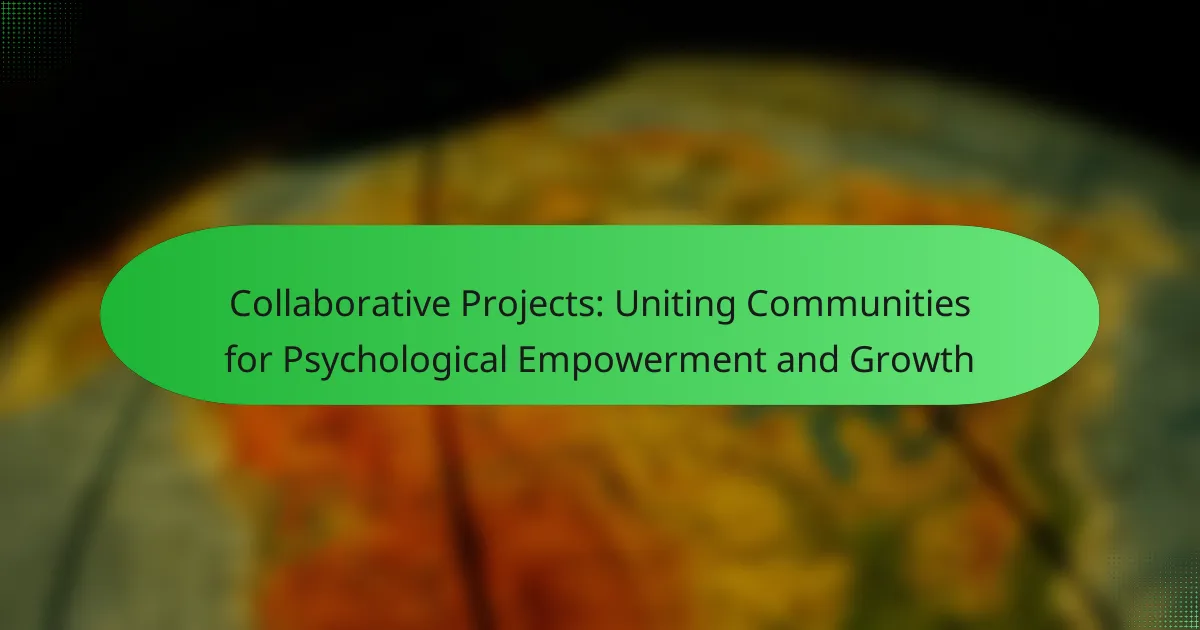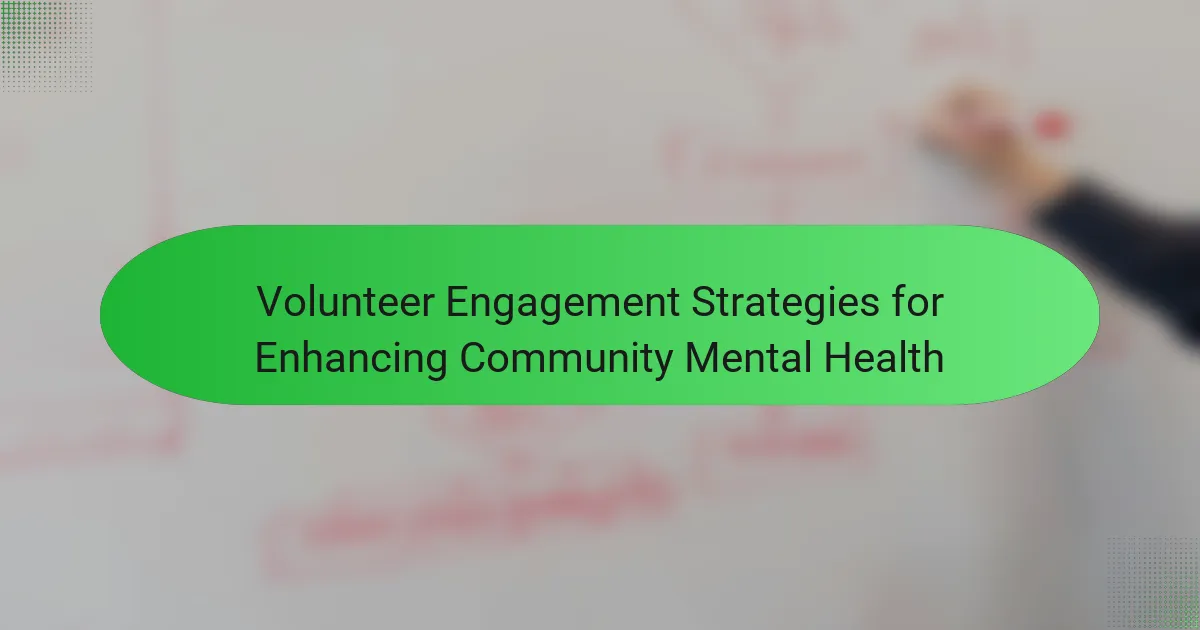Mentorship programs significantly enhance personal development and community connection. They provide guidance, support, and networking opportunities that foster self-awareness and skill development. These programs promote accountability and confidence while creating networks that lead to additional resources. Emerging trends, such as virtual reality and AI-driven matching, are reshaping mentorship experiences for greater effectiveness.

How do mentorship programs enhance personal development?
Mentorship programs significantly enhance personal development by providing guidance, support, and networking opportunities. Participants gain insights from experienced mentors, which fosters self-awareness and skill development.
Mentorship enhances confidence, as mentees receive constructive feedback and encouragement. Additionally, these programs promote accountability, motivating individuals to set and achieve personal goals. Statistics show that 70% of mentees report improved job performance and career advancement, highlighting the programs’ effectiveness in personal growth.
Moreover, mentorship fosters community connection, creating networks that can lead to additional resources and opportunities. This sense of belonging contributes to overall well-being and personal fulfillment.
What skills can be gained through mentorship?
Mentorship programs cultivate valuable skills such as communication, leadership, and problem-solving. Participants enhance their ability to articulate ideas, guide teams, and navigate challenges effectively. These skills foster personal growth and strengthen community connections, creating a supportive environment for development. Mentorship also encourages networking, allowing individuals to build relationships that can lead to professional opportunities. As a result, mentees often report increased confidence and a clearer career path, making mentorship a vital component of personal and professional success.
How do mentorship programs improve self-confidence?
Mentorship programs significantly enhance self-confidence by providing guidance and support. Participants receive constructive feedback, which helps them recognize their strengths and areas for improvement. This personalized interaction fosters a sense of belonging and validation. Additionally, mentorship encourages goal-setting, allowing individuals to achieve milestones and boost their self-esteem. As a result, mentees often experience increased resilience and a more positive self-image.
Which personal growth milestones are achievable through mentorship?
Mentorship programs facilitate various personal growth milestones, including enhanced self-awareness, improved goal-setting skills, and increased confidence. Participants often develop better communication abilities and a stronger professional network. Furthermore, mentorship fosters accountability, encouraging individuals to pursue their aspirations actively. These milestones contribute to overall personal development and community connection.

What role do mentorship programs play in community building?
Mentorship programs play a crucial role in community building by fostering connections and personal growth. They create networks of support that enhance collaboration and trust among participants. These programs often lead to increased engagement in community activities and provide opportunities for skill development. Additionally, mentorship can empower individuals, promoting leadership qualities that benefit the entire community. Ultimately, mentorship programs strengthen social ties and encourage a culture of giving back, enriching the community as a whole.
How do mentorship initiatives foster social connections?
Mentorship initiatives foster social connections by creating supportive networks among participants. These programs encourage collaboration, knowledge sharing, and relationship building. As mentors and mentees interact, they develop trust and empathy, strengthening community ties. Additionally, mentorship can enhance professional networks, leading to increased opportunities and resources.
What impact do mentorship programs have on local communities?
Mentorship programs significantly enhance local communities by fostering personal growth and strengthening connections. They provide guidance, support, and resources to individuals, which boosts confidence and skills. As a result, participants often engage more actively in community initiatives.
These programs can lead to improved educational outcomes, as mentors help mentees navigate academic challenges. They also promote professional development, increasing job readiness and employability in the community. Furthermore, mentorship fosters social cohesion, building networks that support community resilience.
Statistically, communities with active mentorship programs report higher rates of community involvement and lower crime rates. Mentorship creates a culture of giving back, encouraging mentees to become future mentors, perpetuating the cycle of support and growth.
Which organizations are leading successful mentorship initiatives?
Organizations leading successful mentorship initiatives include Big Brothers Big Sisters, SCORE, and the YMCA. These entities foster personal growth through structured programs that connect mentors with mentees, enhancing community ties. Big Brothers Big Sisters has a unique attribute of one-on-one mentorship that significantly impacts youth development. SCORE provides business mentoring, helping entrepreneurs navigate challenges, while the YMCA focuses on holistic development through various programs. Each organization demonstrates a commitment to fostering connections and personal growth in diverse communities.

What challenges do mentorship programs face in different cultures?
Mentorship programs face various challenges across cultures, including differing communication styles, power dynamics, and cultural expectations. These factors can hinder relationship building and knowledge transfer.
In collectivist cultures, mentorship may emphasize group harmony over individual achievement, complicating personal growth. Conversely, in individualistic cultures, mentors may prioritize personal ambition, which can lead to misalignment in goals.
Power distance also affects mentorship effectiveness. In cultures with high power distance, mentees may hesitate to challenge mentors, limiting open dialogue. In low power distance cultures, a more egalitarian approach may foster better communication and collaboration.
Additionally, cultural norms regarding authority and respect can shape mentorship dynamics. Understanding these cultural nuances is crucial for fostering effective mentorship programs that promote personal growth and community connection.
How do cultural differences affect mentorship relationships?
Cultural differences significantly influence mentorship relationships by shaping communication styles, expectations, and values. These factors can create both opportunities and challenges in fostering personal growth. For example, mentors from collectivist cultures may emphasize group harmony, while those from individualistic cultures might focus on personal achievement. Understanding these dynamics enhances the effectiveness of mentorship programs, encouraging adaptability and mutual respect among participants.
What barriers exist to accessing mentorship in various regions?
Barriers to accessing mentorship vary by region and can significantly impact personal growth. Key challenges include limited availability of programs, cultural differences, lack of funding, and inadequate outreach.
In some areas, mentorship programs may not be well-established, leading to fewer opportunities for individuals seeking guidance. Cultural norms can also influence the willingness to engage in mentorship, as some communities may prioritize different forms of support.
Financial constraints often restrict the development and sustainability of mentorship initiatives, particularly in low-income regions. Additionally, ineffective outreach efforts can prevent potential mentees from learning about available resources.
Addressing these barriers requires a multifaceted approach, including community engagement, funding initiatives, and culturally sensitive program development.

Which unique formats of mentorship programs are emerging in 2025?
Emerging mentorship programs in 2025 include virtual reality experiences, peer-to-peer networks, and AI-driven matching systems. These formats enhance personal growth and community connection by providing immersive learning, fostering collaboration, and personalizing mentorship pairings.
Virtual reality mentorship allows participants to engage in realistic scenarios, enhancing skill development. Peer-to-peer networks encourage shared learning experiences, creating a sense of community. AI-driven matching systems analyze individual goals and preferences, ensuring optimal mentor-mentee pairings for effective guidance.
How do virtual mentorship programs differ from traditional models?
Virtual mentorship programs offer flexibility and accessibility, unlike traditional models that often require in-person meetings. Virtual formats eliminate geographical barriers, allowing mentors and mentees to connect across distances. Additionally, these programs can leverage technology for resources and communication, enhancing engagement. Traditional mentorship may provide more personal interaction, but virtual formats cater to diverse schedules and learning styles.
What are the benefits of peer mentorship compared to hierarchical mentorship?
Peer mentorship fosters collaboration and mutual support, offering benefits such as enhanced personal growth and community connection compared to hierarchical mentorship. Peer mentors often share similar experiences, creating a relatable environment that encourages open communication. This dynamic promotes a sense of belonging and shared responsibility, which can lead to increased motivation and accountability.
Additionally, peer mentorship allows for diverse perspectives, as mentors and mentees learn from each other’s unique backgrounds and challenges. This exchange can lead to innovative problem-solving and personal development that may not occur in traditional hierarchical structures.
Furthermore, peer mentorship often results in lasting relationships that extend beyond formal programs, fostering a supportive network that benefits both parties long-term. In contrast, hierarchical mentorship may focus more on authority and expertise, which can limit open dialogue and personal connection.

What best practices ensure effective mentorship experiences?
Effective mentorship experiences rely on clear communication, mutual respect, and goal alignment. Establishing a structured framework enhances accountability and fosters personal growth. Regular feedback sessions strengthen relationships and ensure progress. Additionally, creating a supportive community encourages shared learning and diverse perspectives.
How can mentors provide meaningful feedback?
Mentors can provide meaningful feedback by being specific, constructive, and timely. They should focus on the mentee’s strengths and areas for improvement, offering actionable suggestions. This approach fosters personal growth and strengthens community connection. Regular check-ins enhance the feedback process, ensuring it aligns with the mentee’s goals.
What strategies help mentees maximize their learning?
Mentees can maximize their learning through active engagement, goal setting, and seeking feedback. These strategies enhance understanding and foster personal growth. Active participation in discussions ensures deeper comprehension. Setting specific, measurable goals provides direction and motivation. Regular feedback from mentors helps identify strengths and areas for improvement.
Which common pitfalls should be avoided in mentorship relationships?
Avoiding common pitfalls in mentorship relationships is crucial for success. Key mistakes include unclear expectations, lack of communication, insufficient commitment, and neglecting feedback. Establish clear goals and maintain regular check-ins to foster growth.
How can organizations measure the success of their mentorship programs?
Organizations can measure the success of their mentorship programs through participant feedback, retention rates, and skill development metrics. Regular surveys can capture participant satisfaction and perceived value. Tracking retention rates helps assess the program’s impact on employee engagement. Additionally, evaluating skill development through performance reviews indicates the effectiveness of mentorship in fostering professional growth.



